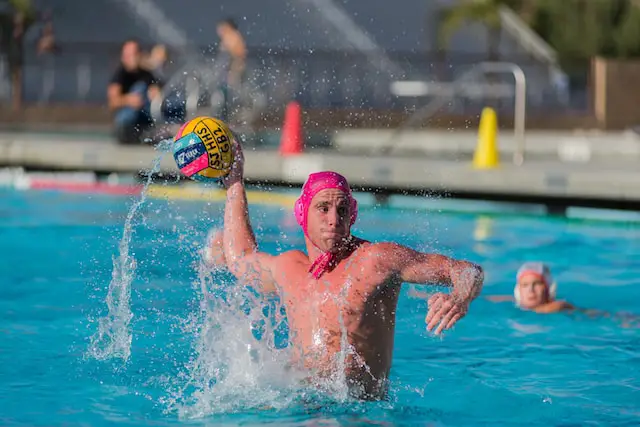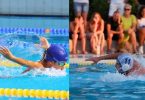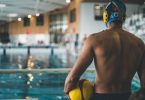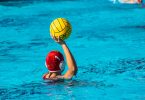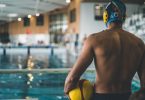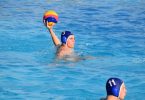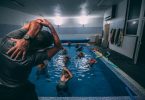While there are many skills that are important in water polo, one skill stands out as being the most crucial: is passing. Passing is the foundation of water polo, and without it, a team will struggle to score goals and maintain possession of the ball.
A strong passing game allows players to move the ball quickly and efficiently, creating scoring opportunities and keeping the defense off-balance.
Passing in water polo requires a combination of accuracy, speed, and situational awareness. Players must be able to make quick decisions about where to pass the ball, while also being able to accurately deliver the ball to their teammates.
A good passer must also be able to read the defense and anticipate their movements, in order to make the most effective passes possible.
Fundamentals of Water Polo
Swimming and Treading Water
Swimming and treading water are the foundation of water polo. Players must be able to swim without any breaks and tread water while handling the ball.
Strong swimming skills, particularly in freestyle, breaststroke, and backstroke, are crucial for water polo players. While having excellent turns, starts, and streamlines is not mandatory, having speed, power, and endurance is essential.
Additionally, water polo players must be comfortable in deep water, even while being pushed down or grappled with, similar to the skills required of Navy Rescue Swimmers.
Ball Handling
Ball handling is another essential skill in water polo. In water polo, players, except for the goalkeeper, are required to catch and pass the ball with precise accuracy using only one hand. The goalkeeper, on the other hand, is allowed to use both hands.
Shooting with power and accuracy is also crucial. Players must learn how to communicate loudly and effectively with their teammates while strategizing on the fly. Maintaining constant field awareness is vital to avoid turnovers and make successful passes.
In summary, the fundamentals of water polo require strong swimming and treading water skills, as well as excellent ball handling abilities. Players must be comfortable in deep water and have the endurance to swim without any breaks.
They must also be able to catch and pass the ball with precision, shoot with power and accuracy, communicate effectively, and strategize on the fly. These skills are essential for any water polo player looking to excel in the sport.
Most Important Skill in Water Polo
Team Communication
Effective communication is crucial in water polo, as it is a team sport that requires constant coordination and collaboration. Players must communicate loudly and clearly with their teammates to ensure that everyone is on the same page.
This includes calling out plays, signaling for passes, and alerting teammates to defensive assignments. In addition, players must be able to communicate effectively with their coach, taking direction and feedback to improve their performance.
Offensive Skills
Scoring goals is the ultimate objective in water polo, so players must possess strong offensive skills. This includes accurate and powerful shooting, as well as precise passing and catching.
Players must also be able to strategize on the fly, making quick decisions based on the movements of their opponents and teammates. Hand-eye coordination is also critical, as it allows players to track the ball and make accurate shots and passes.
Defensive Skills
While scoring goals is important, preventing the opposing team from scoring is equally vital. Players must have strong defensive skills, including the ability to swim quickly and maintain constant field awareness.
They must also be comfortable in deep water and able to fend off opponents who are trying to push them down or wrestle with them. In addition, players must be able to anticipate their opponents’ movements and react quickly to block shots and passes.
Overall, while all of these skills are important in water polo, effective team communication is perhaps the most critical. Without clear communication, players cannot coordinate their efforts effectively, and the team’s performance will suffer as a result.
Developing the Essential Skill
Practicing Drills
One of the best ways to develop the essential skill in water polo is through practicing drills. These drills are designed to help players improve their swimming, throwing, catching, and passing skills. Some of the most effective drills include:
- Swimming laps
- Practicing eggbeater kick
- Doing passing and catching drills with a partner
- Practicing shooting on goal
By practicing these drills regularly, players can improve their skills and become more confident in the water.
Learning from Experienced Players
Another way to develop the essential skill in water polo is by learning from experienced players. Experienced players can provide valuable insights into the game and offer tips and tricks for improving skills. Players can learn from experienced players by:
- Attending water polo clinics and camps
- Watching water polo matches and analyzing gameplay
- Asking experienced players for advice and feedback
Players can improve their understanding of the game and acquire the necessary skills to excel in water polo by observing and learning from experienced players.
Conclusion
Water polo demands a high level of physical fitness as it requires a combination of skills such as swimming proficiency, ball control, and tactical awareness. While all of these skills are important, one skill stands out as the most crucial for success in water polo.
After conducting research and analyzing various sources, it is clear that the most important skill in water polo is swimming ability. Without strong swimming skills, a player will struggle to keep up with the pace of the game and will be unable to position themselves effectively in the pool.
Additionally, swimming ability is essential for both offense and defense, as players must be able to move quickly and efficiently to create scoring opportunities and prevent the opposing team from scoring.
While ball handling and tactical awareness are also crucial skills, they are secondary to swimming ability. A player who is a skilled ball handler but lacks swimming ability will be limited in their ability to contribute to the team. Similarly, a player who has a strong understanding of tactics but is unable to swim effectively will struggle to execute their game plan.
In conclusion, while all skills are important in water polo, swimming ability is the most crucial for success. Players who focus on improving their swimming skills will be better equipped to contribute to their team’s success and achieve their goals in the sport.

